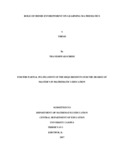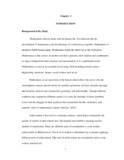Please use this identifier to cite or link to this item:
https://elibrary.tucl.edu.np/handle/123456789/1670| Title: | Role of Home Environment on Learning Mathematics |
| Authors: | Subedi, Thaneshwar |
| Keywords: | family education;parents /family involvement;parent’s economic status;Learning Mathematics |
| Issue Date: | 2017 |
| Publisher: | Faculty of Education mathematics |
| Abstract: | This is a survey study related to the “Role of Home Environment on learning mathematics at grade VIII”. The main objectives of this study were to find the influence of parent’s economic states, family involvement and family education on student mathematics achievement. One hundred ninety five students were selected from four government schools in Rudrapur VDC by using random sampling method. Mathematics achievement test, questionnaire forms were used to collected data. The achievement test item was selected from previous used question and research questions were given to the expert at the department of mathematics education of T.U. According to their suggestion some items were changed and some were modified. The collected data were analyzed by using statistical tools such as mean, standard deviation, correlation coefficient and linear regression. The mean score of students of educated, literate and illiterate father were 40.54, 30.10 and 19.50. The mean score of students of educated, literate and illiterate mother were 38.52, 34.93 and 32.00 respectively. The mean score of students of high, middle and low income family were 46.20, 37.05 and 29.78 respectively. The mean score of students of one hour, two hour and three hour providing time were 31.18, 36.07 and 45.20 respectively. The mean score of student of at least one, at least two and at least three time visiting in school were 31.87, 38.11 and 42.00 respectively. The correlation between the mathematics and family income, father education, mother education, parent provided time, parent visiting in school were found. The mother education and father education had substantial correlation with student mathematics achievement. The family income and mathematics achievement had moderate correlation. Also the parent provided time for student had moderated correlation with student mathematics achievement. Whereas the correlation between parents visiting school and mathematics achievement were low correlated. The regression coefficient of mother education is 0.479, which is highest, so it is most influential and shows that higher mother education helps students to have higher mathematics achievement. The regression coefficient of father education is 0.21 which is also influential for the students to increase their mathematical achievement. The regression coefficient of family income is 0.151 which means when the family income increases then the student achievement also increase. The time provided is 0.156 which is also influential for the students to increase their mathematical achievement. The variable (mother education, father education, income, time provided and parent visiting school) are increase than the student mathematics achievement is also increase. Since the home environmental factors affect the mathematics achievement of student. |
| URI: | http://elibrary.tucl.edu.np/handle/123456789/1670 |
| Appears in Collections: | English Language Education |
Files in This Item:
| File | Description | Size | Format | |
|---|---|---|---|---|
| COVER.pdf | 395.82 kB | Adobe PDF |  View/Open | |
| Chapter.pdf | 1.52 MB | Adobe PDF |  View/Open |
Items in DSpace are protected by copyright, with all rights reserved, unless otherwise indicated.
